Looking for some Russian proverbs, sayings and idioms?
That’s good!
Knowing these will add to your Russian range of expression. You will speak more and express yourself better.
In this post, I’ll cover 10 Russian idioms (or sayings – whatever you want to call them) and provide English translations and explanations so you know when and how to use them.
✅ Hey, if you REALLY want to learn & speak Russian, I suggest RussianPod101. You get 1,000+ audio/video courses, lessons by Russian teachers and a whole learning system. Sign up at RussianPod101 (click here) and start learning! I recommend ’em as a teacher & learner.
1. How to say “Good Luck” in Russian
- Ни пу́ха, ни пера́
- Ni puha, ni pera
- Literal meaning: neither fur, nor feather
This isn’t a direct translation of “good luck.”
“Ни пу́ха, ни пера́” is a saying that literally means “neither fur, nor feather” but is always used as “good luck” before anything, such as a test, job interview, and other things you’d use the phrase for.
The origin of this phrase comes from Russian hunters and is in fact, somewhat sarcastic/ironic.
Feathers was slang for “birds” and “fur” meant animals, so the hunters were really told “Hope you don’t get any birds or animals, haha” to which they replied “К чёрту” (k chertu) meaning “to the devil” or rather, “the hell i won’t.”
Key Russian vocab:
- пух – puh – fuzz, furr, fluff
- перо – pero – feather

2. “A friend in need is a friend indeed” in Russian.
- Друг познаётся в беде́.
- English pronunciation: Droog poznayesta v bede.
- Literally means: A friend is known in time of need.
This idiom pretty much means that a true friend will reveal themselves when you’re in need of something. They’ll be there for you whereas others, upon signs that you need something, will walk.
Key Russian vocab:
- Друг – droog – friend
- познаётся – poznayotsa – is known
- беда – beda – misfortune, trouble
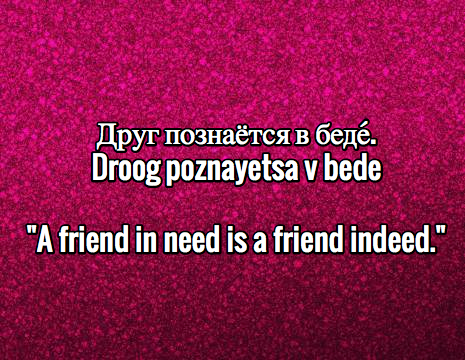
3. “There’s no place like home” or “home, sweet home” in Russian.
- В гостя́х хорошо́, а до́ма лу́чше.
- English pronunciation: V gostyah horosho, a doma lutshe.
- Literally means: Visiting is good, but home is better.
“Visiting” sounds a bit awkward in English but it merely refers to coming over someone else’s house as a guest – whether you’re hanging out with friends, having a house party, or coming over for dinner. So, while it’s nice to be over someone else’s place, home is best.
Key Russian vocab:
- гость – gost’ – guest or visitor
- дом – dom – house or home
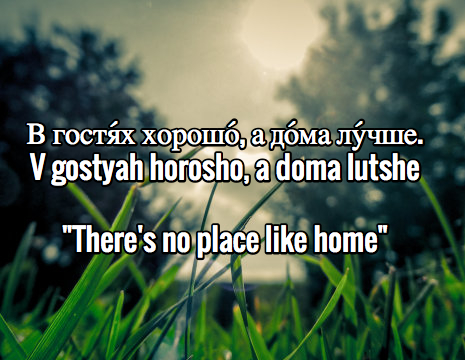
4. “Whatever happens, happens” in Russian.
- Была́ не была́.
- English pronunciation: Bila ne bila.
- Literally means: There was and there wasn’t.
This saying is using the verb “быть” (bit’), or to be, to express uncertainty at whatever will happen after you do something. You’d use it for situations you’re about to attempt something and don’t know how it will end up – such as starting a business, confessing love, or skydiving.
Key Russian vocab:
- быть – bit’ – to be

5. “No pain, no gain” in Russian.
- Без труда́ не вы́тащишь и ры́бку из пруда́.
- English pronunciation: Bez truda, ne vitashish i ribku iz pruda.
- Literal meaning: Without effort, you won’t pull a fish out of a pond.
Everything worthwile requires push and effort. You won’t learn Russian on Facebook. You won’t learn it by passively listening to audio material. You need to sweat, look up words, memorize them, and use them. And such, without effort, you won’t be catching any fish.
Key Russian vocab:
- Без – Bez – Without
- труд – trud – work, labor, effort
- вытащить – vitashit – to pull
- пруд – prood – pond
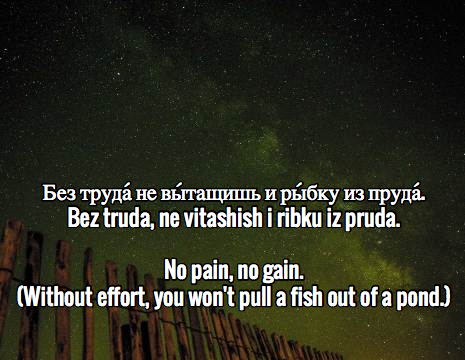
6. “Better late than never” in Russian
- Лу́чше по́здно, чем никогда́.
- English pronunciation: Lutshe pozdno, chem nikogda
- Literal meaning: Better late, than never.
See? Russian language has some positivity in it. So, if you didn’t do that homework, you can still hand it in. And if you haven’t done your taxes – it’s better to be late than never. Same thing with learning Russian, that is, if you apply proverb #5.
Use it as you would use it’s English equivalent.
Key Russian vocab:
- Лу́чше – Lutshe – Better
- по́здно – pozdno – late
- чем – chem – than
- никогда́ – nikogda

7. “Live and learn” in Russian.
- Век живи́ — век учи́сь.
- English pronunciation: Vek zhivi, vek uchis.
- Literal Meaning: Live for a century, learn for a century.
In English, live and learn has a slight negative connotation to it.
You’d usually use it after someone has screwed, wronged you or you made a mistake. This Russian proverb however is a lot more positive and it’s meaning is more direct – life is a learning process, so as you live, you will learn.
The focus here is on the importance of education and learning for as long as you’re alive.
Key Russian vocab:
- Век – Vek – Century
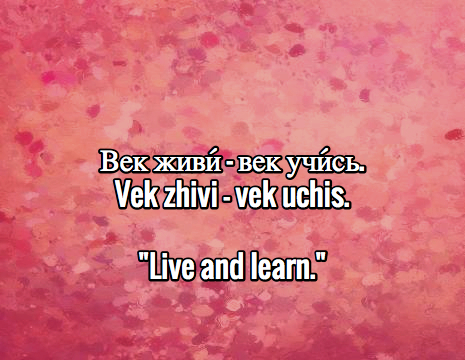
8. “Still waters run deep” in Russian.
- В тихом омуте черти водятся.
- English pronunciation: V tihom omute cherti vodyatsa.
- Literal meaning: In a quiet pond/lagoon, devils dwell.
This proverb matches its English equivalent exactly. “Still waters run deep” means “a quiet or placid manner may conceal a passionate nature.” And similarly in Russian, under calm waters, devils dwell, which refers to a crazy or extreme characteristic of a person’s personality you hadn’t anticipated.
Basically, this means that someone has a secret quality that doesn’t fit your general impression of them or does something that you didn’t think they would do. Like if you’re living in the middle of nowhere, USA and start learning Russian. That’s pretty surprising.
Key Russian vocab:
- тихий – tihiy – quiet
- омут – omut – lagoon, pond
- черт – chyort – devil/demon

9. “Every dog has his day” or “The sun will shine on our street too” in Russian.
- Будет и на нашей улице праздник!
- English pronunciation: Budet i na nashey ulitse prazdnik.
- Literal meaning: There’ll be a party on our street too.
Another hopeful, positive proverb. It pretty much means that a better time is coming. If you look over at your neighbor and they’re having a party on their street and getting turned up, and you aren’t … well good sir, there’ll be a party on your street too.
Key Russian vocab:
- Будет – budet – there will be
- нашей – nashey – our
- улица – ulitsa – street
- праздник – prazdnik – celebration, party
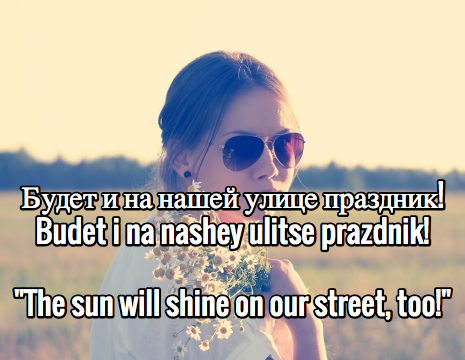
10. “Love is blind” in Russian.
- Любо́вь зла́, полю́бишь и козла́.
- English pronunciation: Lybuov zla, polyubish i kozla.
- Literal meaning: Love is so cruel that you could even fall in love with a goat.
In Russian slang, a goat (козел, kazol), refers to a dead-beat man, hence the saying.
Just in case you were wondering otherwise.
I’m not sure where this proverb comes from as I kind of like to choose people I like. But I guess I’m too rational for my own good. This proverb would apply to people married or in relationships with total assholes that they still love regardless. Love is cruel, isn’t it?
Key Russian vocab:
- Любо́вь – Lyubov – Love
- зло – zlo – evil
- полюбить – polyubit – to fall in love
- козел – kazol – goat
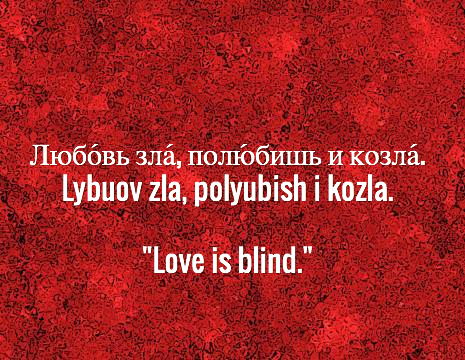
What do you think?
Make sure to leave a comment and share this post. Should I add more? Read part 2 here.
Want to learn to Russian with effective lessons? Sign up for free at RussianPod101 and start learning and speaking Russian!
>> Click here to sign up for free and learn Russian at RussianPod101!

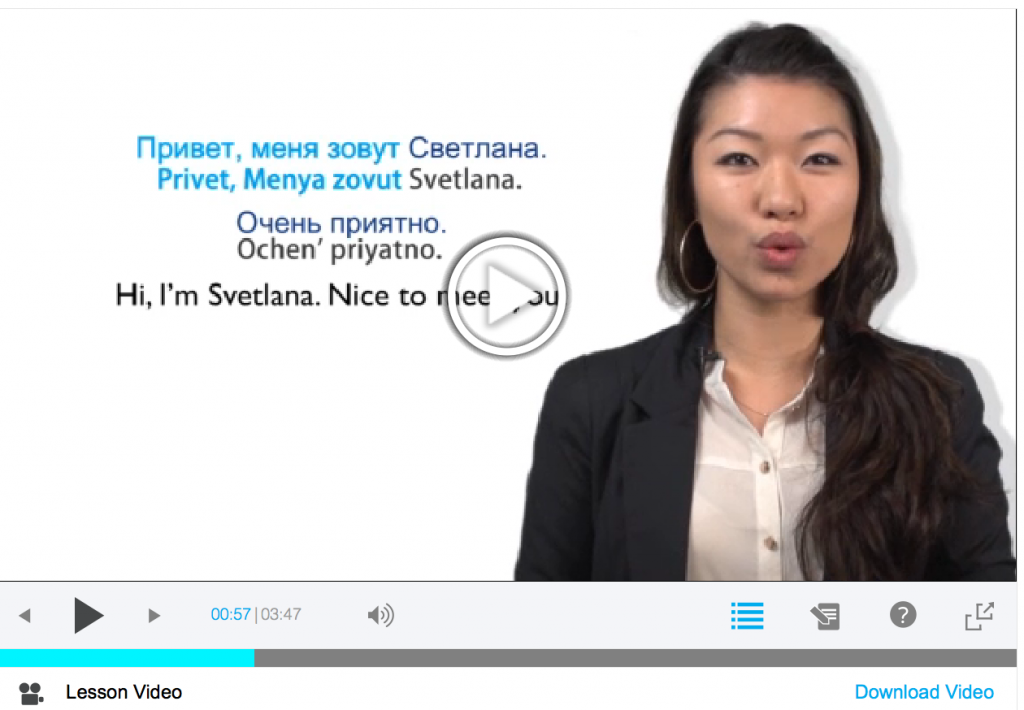
9 not 8. “Every dog has his day”
RAWR
[…] Read part 1 here. […]